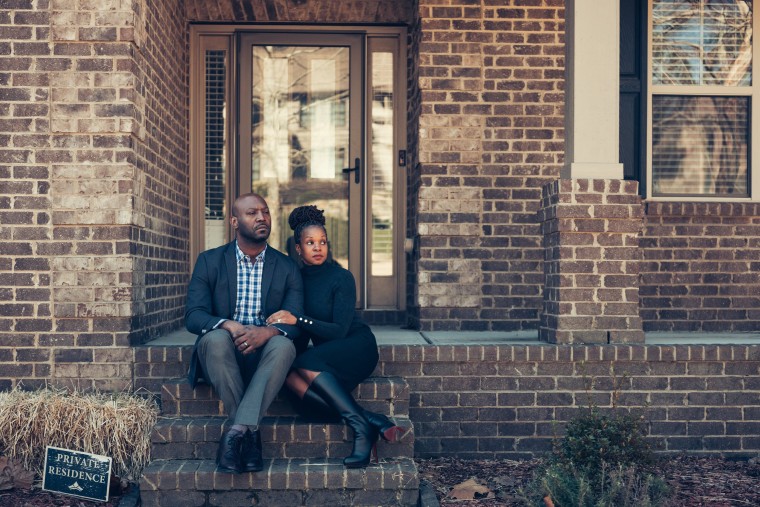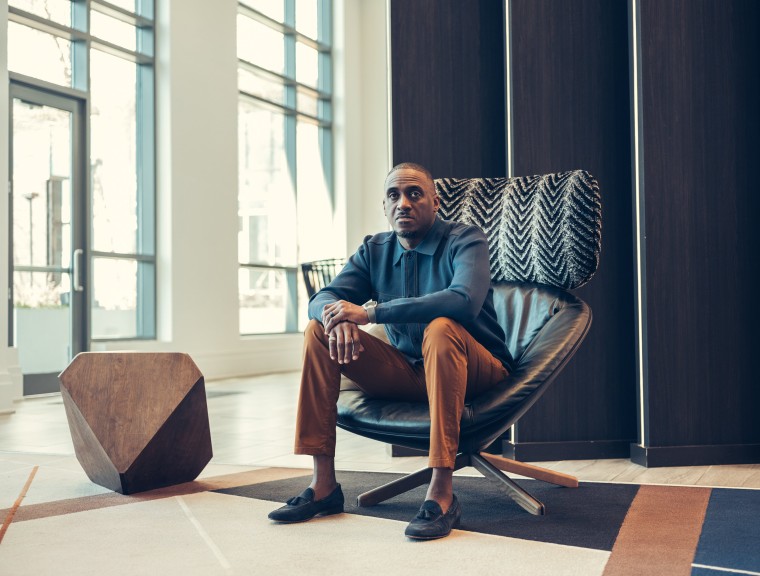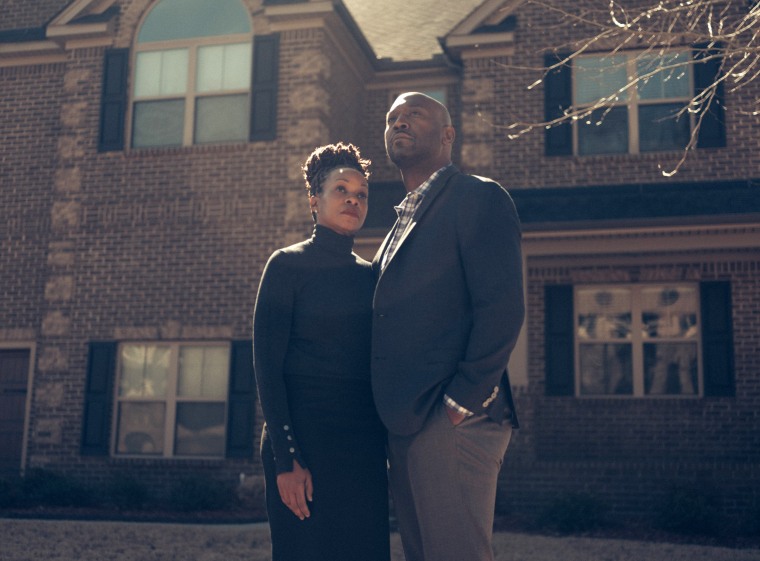'Frustrating, deterring and upsetting': Georgia voting law changes alarm Black voters
'We're very concerned': Black voters fear changes to Georgia voting laws
Many voting rights organizations are trying to address concerns ahead of the primaries and the midterm elections.
March 2, 2022, 1:10 PM EST
ATLANTA — Varana King said she was excited to vote early with her husband, Gregory, in the presidential election last fall.
But when they arrived at the South Cobb Regional Library in Mableton, Georgia, at 9 a.m., she said, there were at least 1,500 people already in line. More than eight hours later, the couple — both of whom served in the U.S. Army — finally cast their ballots.
"Everything that could happen did happen while we were standing in line," Varana, 56, said. That included a downpour and swollen feet.
"In my mind, if we're still having these types of problems, it's intentional," she said.
Varana believes things will only be worse at some locations since Georgia Gov. Brian Kemp, a Republican, signed a restrictive voting law last year. The measure, Senate Bill 202, limits early voting sites and restricts both the number and the available hours of drop boxes. And she's not alone.
A recent Quinnipiac University
poll found that among Black registered voters in Georgia, only 40 percent expect it to be very easy to vote in 2022, compared with 73 percent of white registered voters. Fewer than 20 percent of Black people polled believe all eligible people in Georgia will have a fair opportunity to vote in the 2022 general elections.
Varana, who is a retired government worker, said she will not be deterred but fears other people will be discouraged. Many voting rights organizations are trying to address concerns ahead of the primaries and the midterm elections.
Last year, at least 19 states
passed 34 restrictive laws, according to an analysis by the Brennan Center for Justice at the New York University School of Law, which tracks voting bills and advocates for federal election legislation.
Passed last March, Georgia's law requires identification for mail-in voting, makes it illegal to take food or water to voters waiting in line, and allows state election officials to take over the administration of county elections. Kemp has said the law would make it "easy to vote and hard to cheat."
Richard Rose, president of the Atlanta NAACP, said that among the biggest concerns he has heard from Black voters is that the law will make it harder for people to cast absentee ballots and vote by mail, and that it has allowed a reduction in the number of polling places in Republican-controlled counties.
He said it was reminiscent of Jim Crow-era laws that suppressed the Black vote.
"If the Republicans can just discourage 300 voters out of each county — there are 159 counties in Georgia — that would have been enough to change the outcome in Georgia in 2020," Rose, 73, said in a recent interview as he left the state Legislature. "We are very concerned about how these things will impact voting rights."
That much is apparent to other Black residents of Georgia like Ted Winn, a recording artist, podcast host and social justice advocate.
"A lot of people are feeling concerned about the new laws that are in place and the ways in which those laws are impacting Black people and poor people," he said. "What's fascinating about it is it's not some clandestine approach to voter suppression. It's very open and in your face and unapologetic. And that is, I think, frustrating, deterring and upsetting to a lot of folks here on the ground."
"What's fascinating about it is it's not some clandestine approach to voter suppression," social justice advocate Ted Winn said.Aboubacar Kante for NBC News
Carl and Chandra Abbott, who live in southwest Atlanta, said they are concerned about potential changes to voting hours that aren't conducive for working parents like themselves.
In some areas, the most minor change can shift someone's willingness to vote, Carl, 44, who works in medical sales, said.
"It's very clear that it's largely by design, for it to have to be a hurdle," his wife, Chandra, 45, said. "And that's very unfortunate, with everything that we, definitely as Black people, have worked for to kind of get this equal footing as it relates to our right to vote."
Even so, the couple said it will have no effect on whether they do vote.
Chandra, a scientist in the pharmaceutical industry, said she worries some Black people are also experiencing "fight fatigue."
"I think despite all the other struggles that are going on — the pandemic, racial injustice ... there's a fatigue, I think, too. A fight fatigue," she said. "So it's like, what issue are you going to focus on?"
Chandra Abbott, a scientist in the pharmaceutical industry, and her husband, Carl, who works in medical sales.Aboubacar Kante for NBC News
Hillary Holley, organizing director of Fair Fight Action, a voting rights organization, said one goal of voter suppression laws is to confuse people to the extent that it discourages Black people and other voters of color from showing up to the polls. Her group was founded by
Stacey Abrams, who narrowly lost her bid for Georgia governor in a contest marked by allegations of voter suppression affecting mostly Black voters.
Over the years, however, there has been a greater turnout among Black voters, despite attempts to suppress their votes, Holley said.
"What I hear from Black voters today is they are upset with the voter suppression laws," she said. "They're angry that people are trying to restrict their access to the ballot."
But after expressing that frustration and anger, she said, "their next question is always, 'OK, so what do we do?' That's what I hear across the state."
"A lot of young voters, and I'm a Black voter who was born and raised in Georgia, we were taught to think that this was over, that our nation had overcome this," Holley said. "And the fact that we're still having to deal with this, it is frustrating."
She said that during the 2018 gubernatorial election when Abrams challenged Kemp, the Democratic Party of Georgia received more than 50,000 phone calls through its voter protection hotline mostly from voters of color from across the state who encountered issues when they went to cast their ballots.
"So think about it: If those 50,000 people wouldn't have called, that would have a significant impact on the results," Holley said.
Fair Fight Action and several of its allies have begun trying to reach voters of color to get ahead of any of the confusion, she said. Among other things, the organization will rely on paid visibility campaigns through partnerships with restaurants across the state to distribute nonpartisan voter education materials.
"Oftentimes, voters will have questions about the new voting laws, voters will reach out to us with any concerns they may have," she said. "And then what we do is, we respond to them, but we also do a lot of proactive programs to teach voters."
Varana grew up in Greenwood, Mississippi, where historical markers identify sites of the civil rights movement, and where Black people protested for voting rights in the 1960s. She said she was taught the importance of voting by her parents and her grandparents as a child but she is not entirely confident that future elections will be run properly or that her vote will count. She plans to exercise her right to vote anyway.
"I've always been wary of that," she said.
Get the Morning Rundown
Get a head start on the morning's top stories.









